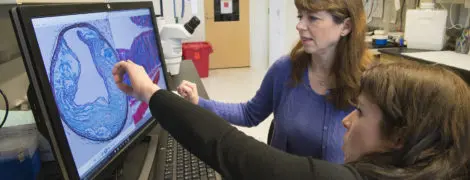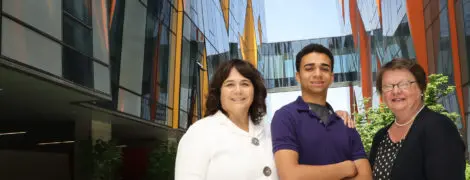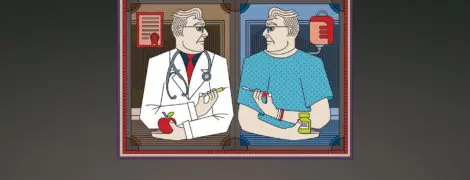Diabetes is a growing epidemic in the U.S.; about 13% of all adults have the disease.
But for certain people, like those in the Latinx community, it creates a particularly heavy burden. They are more likely to get diabetes at a younger age and to die from complications than white patients. At the same time, many in the Latinx community face barriers in accessing healthcare.
“Diabetes is a huge problem in the Latinx community,” says Lorena Alarcon-Casas Wright, MD, a UW associate professor of metabolism, endocrinology and nutrition. “We need to pay more attention to this population to address the disparities in care.”
To better serve the community, Wright has established a Latinx diabetes clinic at UW Medicine. In addition to offering care for Spanish-speaking patients, she has made the clinic a community outreach point and a hub for culturally humble medical education.
A shared culture
Wright, who is originally from Mexico, has always known the value of sharing her patients’ language and culture.
“Especially for a chronic disease like diabetes, having a good relationship with your patients is very important, and language can be a huge barrier,” she says.
Although Wright has cared for Spanish-speaking patients for years, she dreamed of reaching more people with a clinic for Washington’s Latinx community — the second largest demographic group in the state. Latinx people represent 13% of Washington’s population, but only 3.4% of its doctors, creating a significant shortage in bilingual and culturally humble care.
In November 2020, Wright’s dream came true with the clinic’s grand opening. Held weekly on Tuesdays, the clinic is located in the Diabetes Institute at UW Medicine’s South Lake Union campus. Patients can self-refer or seek a referral from their healthcare provider.
Today, the clinic’s staff includes two physicians — Wright and Leo Morales, MD, PHD, FACP, a professor and chief diversity officer for the UW School of Medicine — a diabetes educator/nutritionist, a medical assistant, a clinic manager and three nurses. Everything from appointment scheduling to patient education to specialist referrals is in Spanish.
With support from the community, they could add several much-needed positions: a social worker, a psychologist and a nurse. Social workers connect patients to social support, nutrition and financial counseling services. Psychologists can help with the mental health issues that can arise from managing a complex, chronic disease and its complications.
In addition, the clinic also gives medical students, residents and fellows opportunities to do rotations. They learn about caring for Latinx patients, social determinants of health and how cultural differences affect healthcare. Understanding a patient’s background and learning to build trust, says Wright, is key to helping them manage their health.
“For example, Latinx patients use a lot of herbal products or natural remedies, but if they don’t feel comfortable with their providers, they won’t mention it — and that might make a difference,” says Wright. “Knowing what kind of foods Latinx people prefer, and having realistic expectations and sustainable goals, is all part of cultural care.”
Prediabetes care helps high-risk patients thrive
The clinic has expanded its services to patients with prediabetes, too. Because people with prediabetes are at high risk of diabetes but don’t yet need treatment, says Wright, they may be overlooked until their condition worsens.
However, early interventions such as patient education, nutrition and lifestyle changes, and screening for cardiovascular risk can make a big difference. That’s where the clinic comes in.
“It’s the best time for interventions, because they haven’t had complications,” says Wright. “They may have a family history of diabetes, and if we recognize prediabetes, we can do something about it. We want them to realize it’s something you can change, especially early on.”
Wright and Morales plan to work with local primary care providers to increase awareness and encourage physicians to refer patients early in the prediabetes stage to the Latinx clinic for follow-up care.
Improving healthcare equity
Social determinants of health are a major factor in healthcare disparities — and a global pandemic has only made the inequity worse. Patients with diabetes, or complications from diabetes, are at much greater risk of having a severe case of COVID-19. Yet many Latinx people are essential workers who can’t work from home. Large, multi-generational households increase the risk of exposure. And a lack of access to technology can make it challenging for patients to use telemedicine.
To spread the word about the clinic and help more Latinx people access care, the clinic does frequent community outreach. They give presentations at community and neighborhood clinics, offer educational workshops on diabetes and nutrition, and provide diabetes screening and education at local health fairs.
The clinic will also help connect Latinx patients to clinical trials. “Many clinical trials have underrepresented Latinx populations,” says Wright. “Having a big population of Latinx patients is an opportunity to have more participation, which is really needed.”
With Spanish-language services, cultural care and community outreach, the clinic is working hard to build strong, trusting relationships with Washington’s Latinx community. And philanthropic support can play a vital role in helping Latinx people access diabetes care more easily.
“We want our patients to feel that when they come to our clinic, we are going to help them, regardless of their background,” says Wright.
Written by Stephanie Perry








